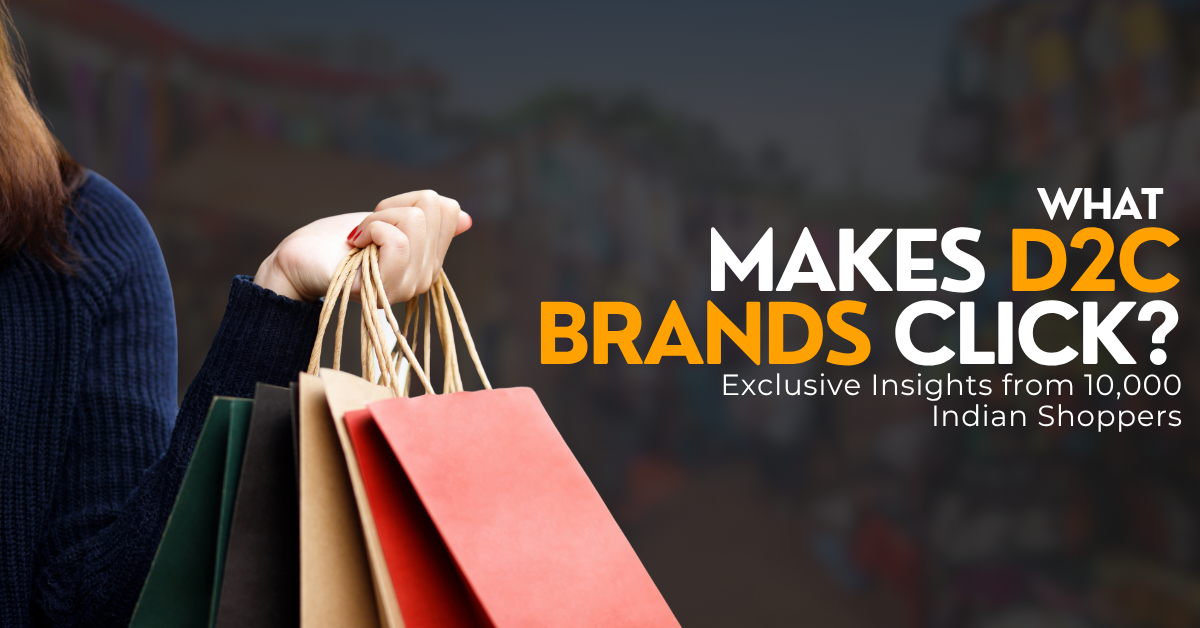Introduction: The D2C Revolution is Consumer-Led
India’s Direct-to-Consumer (D2C) space is booming — not just because of digital infrastructure, but because today’s consumers are choosing experiences over advertisements. Whether it’s ordering chemical-free skincare, guilt-free snacks, or sustainably made clothes, Indian shoppers are connecting deeply with D2C brands that understand them.
We studied responses from 10,000 Indian customers across cities, towns, and rural areas to decode why they trust, buy from, and stay loyal to D2C brands. Their feedback reveals not just trends, but behavioral shifts that D2C founders must understand to thrive.
Why Shoppers Are Turning to D2C Brands
Unlike legacy brands, D2C businesses don’t rely on shelf space or middlemen. They speak directly to customers, craft unique product stories, and deliver digitally-native experiences. The modern buyer isn’t just looking for a product — they’re looking for trust, values, speed, and personalization.
Let’s explore the key insights from the survey.
1. Product Quality Is the Top Priority
No matter the category, quality remains king. Shoppers are tired of overhyped, underdelivered goods. 81% of respondents said they return to D2C brands that consistently deliver high performance, whether it’s a moisturizer that actually hydrates or a protein bar that tastes clean.
They look for:
Clean, honest ingredients
Effective results
Minimal packaging waste
Long-lasting use
Top-performing brands like Minimalist, Kapiva, and The Whole Truth succeed because they don’t compromise on product integrity.
2. Fast, Reliable Delivery Builds Trust
Today’s consumers don’t have the patience for vague shipping updates or broken logistics. 67% of shoppers said they expect clear tracking, timely delivery, and transparent updates — or they won’t buy again.
Winning brands ensure:
Same-day or 48-hour delivery options in metros
Auto-updated tracking links via WhatsApp/SMS
Neat, branded, and tamper-proof packaging
No hidden delivery charges
If the product is great, but delivery is delayed or confusing, trust is lost instantly.
3. Personalization = Retention
Personalized brand experiences are no longer a “nice-to-have” — they’re expected. Over 60% of respondents said personalization made them feel more valued and increased the chances of reordering.
This includes:
Product suggestions based on browsing or purchase history
Special discounts for loyal customers
Festival greetings or birthday messages
Custom packaging with their name or note
D2C brands that treat customers like individuals, not invoice numbers, create emotional stickiness.
4. Brand Transparency is the New Loyalty Program
Modern Indian shoppers — especially Millennials and Gen Z — demand transparency. They want to know what’s in the product, how it’s made, and what the brand stands for.
72% of users said they feel more confident buying from a brand that is:
Open about ingredients or materials
Vocal about their sourcing and production process
Clear about pricing breakdown
Ethical in environmental or labor practices
Transparency isn’t just a bonus — it’s part of the buying decision.
5. Price Matters, But Value Matters More
Consumers are ready to spend more — but only when they see the value. Discounts help with first purchases, but they don’t drive loyalty.
From our insights:
53% of users said they would happily pay more if the quality matched the price
31% said flashy discounts made them suspicious
16% said they shop based on price alone
Smart D2C brands use educational content to justify their pricing — explaining processes, ingredient costs, craftsmanship, or sourcing methods.
Key Preferences of D2C Consumers – Survey Snapshot
| Factor Influencing Loyalty | % of Respondents | Consumer Expectation |
|---|---|---|
| Product Quality | 81% | Effective, safe, and thoughtfully made products |
| Timely Delivery | 67% | Clear shipping, fast arrival, proper packaging |
| Personalized Communication | 60% | Tailored offers, messages, and curated products |
| Ethical and Transparent Branding | 72% | Honest, open, and value-driven brand narratives |
| Price vs Value Balance | 53% | Fair pricing based on quality and sourcing |
The Role of Storytelling and Values
Indian consumers are more emotionally connected than ever before. They don’t just buy a shampoo — they buy a philosophy, a mission, a founder’s journey. When customers resonate with your story, your values, or your cause — they become brand advocates.
Examples that stood out in the survey:
Sustainability: Brands using recyclable or zero-waste packaging
Inclusivity: Campaigns featuring real people, not models
Local Love: Proudly Indian-made products with indigenous ingredients
Founders-as-Faces: Story-led campaigns by real brand creators
Influencer-Driven Discovery Is Real
Over 45% of users said they discovered their favorite D2C brand through micro-influencers or content creators, not TV ads or Google search.
Most impactful content included:
Honest “unboxing” videos
Skincare or food “reviews after 30 days”
Comparison reels vs. big-brand competitors
Behind-the-scenes factory or production tours
Consumers don’t just follow influencers — they trust them like friends. Partnering with the right voices is key to growth.
The Smallest Touchpoints Drive the Biggest Impact
Shoppers repeatedly praised small gestures that made their experience memorable:
Eco-friendly notes in boxes
Reusable cloth packaging
Thank-you cards with handwritten names
Surprise samples with orders
Quick replies on Instagram DMs or WhatsApp
These thoughtful extras create brand moments that drive word-of-mouth and referrals.
Conclusion: Why D2C Brands Win — and How to Stay Winning
D2C isn’t just a business model — it’s a mindset. Brands that win are those that treat every customer like a relationship, not a revenue stream. They deliver value, clarity, connection, and confidence.
If you’re building a D2C brand in India, focus on:
Reliable product excellence
Experience-first delivery
Humanized personalization
Transparent storytelling
Purpose-driven messaging
The modern Indian shopper is sharp, self-aware, and community-driven. If you respect their values, you’ll earn their loyalty — and their recommendation.
Read







